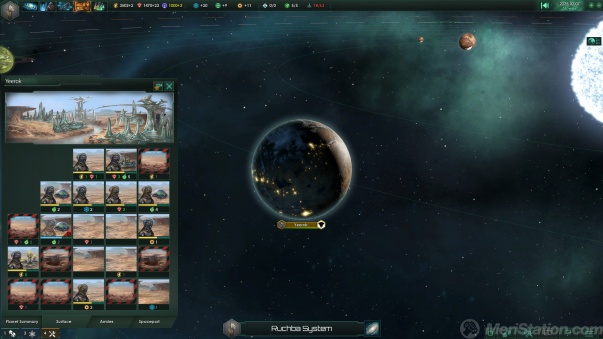A galactic Universalis Europa? Not exactly, although Stellaris partly recalls the Paradox star game in certain playable mechanics, it is clear that the game also drinks from other games such as Galactic Civilization, but, yes, without turns.
The game presents a series of empires to our choice, each one represents a series of own characteristics, the merely aesthetic, such as the physical aspect of our race, our flag, names, appearance of our cities or our ships.
More important are the aspects that directly affect how our empire developed, such as the climate of the planet of our civilization, something really important because it determines the ease that our people have to settle on certain planets, so, if the native planet of our people is of an arid climate,
they will have preference and facility to colonize planets of similar characteristics, and greater difficulty to colonize and settle in planets.
Another of the fundamental aspects of our empire are the ethics and the type of government. Ethics roughly represents the ideology of our empire, and each ethic has specific characteristics, with its bonuses and penalties, and also, the combination of ethics
unlocks the types of government that we can have. As an example, if our empire is Xenophile and Individualist, our empire may choose to be Indirect Democracy or Plutocratic Oligarchy, modes of government that obviously also have their advantages and disadvantages.
Finally, the last important characteristic when selecting a civilization is the choice of the type of initial weaponry that we have, which can be varied as the game progresses, and the method of travel between systems for our naval, to choose between Curvatura,
the simplest and most basic, hyperspace, and Wormhole. The latter allows our ships to travel from any point of the system, and very quickly, but with one, this system requires having wormhole stations built to make trips, so for a first game it may be a bit more complicated.
But what if I do not like any of the empires that the game offers me? The game allows us to create our own personalized empire, not only with the
tools that the game itself brings, but also with the various mods that we can find, in Steam Workshop where we will find a multitude of diverse content created by the community.
Once chosen our empire, selected the initial difficulty and the size of the galaxy, we started our game. Like other Paradox games, Stellaris is a game in real time, but with the possibility of pausing at any time to do things as calmly as you want, although the game does not require too much micromanagement, making it easy to play at difficult normal without taking breaks.
The interface really fulfills its purpose, is clear, simple, and gives ease to get used to it. In it we can see the resources of our empire, energy, minerals
and strategic, as well as the influence of our empire, the research points, the naval capacity of our empire, as well as the number of planets that we have.
Energy is a fundamental resource for our empire, because it serves to maintain operative buildings, ships or stations, that is, we use energy essentially to keep our empire standing. Minerals are also used to maintain the ships of our empire, however the main use of minerals is not the maintenance, but the construction, both of ships and buildings and stations.
The research points, divided into three, physics, society and engineering, are used, as could not be expected otherwise, to investigate, the more points we have of a branch, the faster we will investigate. We can simultaneously maintain up to three research projects, with one scientist in charge for each project.
Influence is not a resource in itself, but it allows us to perform certain actions in the game, such as recruiting scientists, admirals for our army,
building border posts, something that we will see later, as well as promulgating Edictos, a series of policies that they will give certain specific bonuses, such as an Edict that favors research, in exchange for losing influence.

